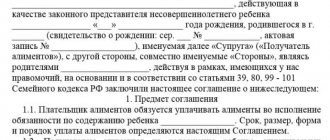- Statute of limitations
- Step-by-step instructions for collecting alimony debt after reaching adulthood Appeal to a senior bailiff
- Collection of alimony debt in court
- Sample claim
Family law obliges each parent to support their children (including paying alimony for them) until they reach adulthood . If the alimony-obligated parent has faithfully paid the assigned funds during this period, then when the child reaches the age of 18, the alimony obligations cease. However, this is only true if there is no debt .
If there is arrears of alimony, but the child is already 18 years old, then the bailiff does not have the right to close enforcement proceedings (IP). He is obliged to apply a number of enforcement measures to the payer until the debt is fully repaid .
If you have a child support debt after 18 years, you can appeal the bailiff’s decision to terminate enforcement proceedings (if it was made) and even file a claim in court . At the same time, the alimony debt is not subject to the statute of limitations . However, if financial assistance was not previously collected on the basis of an agreement or court order, alimony can be collected after 18 years only with restrictions .
What to do if a child turns 18 and still owes child support?
One of the grounds for termination of enforcement alimony proceedings in relation to minor children is their reaching the age of 18 years - see Part 2 of Art. 120 of the Family Code (SC) of the Russian Federation. Based on the fact of reaching the age of majority, the bailiff is obliged to close the proceedings on the case, but only if the payer has no alimony debt and his obligations to the child are fulfilled in full .
However, in practice, unfortunately, the situation often does not comply with the law - irresponsible representatives of government agencies represented by bailiffs rush to close the individual entrepreneur as soon as the child turns 18, not paying attention to the existence of a debt. In this situation, the claimant is faced with three significant violations of the law :
| Type of violation | How does it manifest itself? | |
| 1 | Infringement of the child's rights to maintenance | Failure of the debtor to fulfill alimony obligations |
| 2 | Inaction of an official (bailiff) | Failure to apply penalties to the defaulter |
| 3 | Illegal actions of the bailiff | Premature termination of enforcement proceedings with outstanding debt obligations |
Confirmation of the violation of the claimant's right in this situation will be an official document - a resolution to terminate enforcement proceedings , which will state the basis - the child reaching the age of majority.
To collect debts from a defendant after 18 years of age, the recipient of the funds must appeal the termination order .
Debt for alimony after adulthood: statute of limitations
Many unscrupulous alimony payers rely on the fact that the debt is written off based on the expiration of the statute of limitations . If there is a notarial agreement or a court decision to pay alimony, the length of the period for which the debt can be collected is affected solely by the payer’s fault or lack thereof .
If the formation of the debt is not the payer’s fault (and he proves this), then the court may reduce or even write off the alimony debt. However, if the alimony provider is guilty of non-payment of material resources, then the debt will be collected for the entire time (the entire period) during which alimony was not paid, and there is no statute of limitations (Part 2 of Article 113 of the RF IC).
Example . Child support was collected when the son was 12 years old (by notarial agreement or court decision - it doesn’t matter). The parent avoided paying them until the child came of age. Debt for 6 years (from 12 to 18) will “hang” with the draft dodger for an unlimited amount of time - not only until he reaches 21 years of age, but even longer - until the debt is fully repaid.
Moreover, in the event of the death of a payer who has an alimony debt, the claimant has the right to legally demand from the heirs of the deceased payment of the debt within the value of the inherited property. This right is confirmed by judicial practice - see Determination of the Judicial Collegium for Civil Cases of the Supreme Court 45-КГ16-1 dated 03/01/2016.
It should be borne in mind that if alimony was not collected at all (that is, there is no notarial agreement and court decision ), then alimony can only be obtained within the established statute of limitations (for three years prior to going to court).
Arbitrage practice
From judicial practice in cases of collection of alimony debt, one must be guided by Resolution of the Supreme Court of the Russian Federation of December 26, 2017 No. 56. This review contains a number of important points:
- to confirm the debt for the previous period, you can refer to telegrams, registered letters with notifications, or email messages;
- evidence will also be a proposal to the debtor to enter into an agreement on the payment of alimony, or a court order, later canceled due to the objections of the defendant.
Find out more How to apply to the registry office through government services
Since the protection of children is a priority of state policy, in most cases the court makes decisions in favor of the claimants. The debtor can only claim a recalculation of claims and a reduction in the amount of the penalty for various reasons.
Collecting alimony debt after the child reaches adulthood: step-by-step instructions
If the child has already reached the age of majority , and the collector knows that the defendant has a child support debt , first you need to find out what stage the child support case is at. To do this, you need to communicate with the bailiff - the best option would be to visit him in person.
Thus, the claimant will have the opportunity to independently familiarize himself with the alimony file and review all the latest documents contained in it (in accordance with Part 1 of Article 50 of Federal Law No. 229-FZ of October 2, 2007 “On Enforcement Proceedings”). If the proceedings are completed untimely, the person receiving child support must make a copy of the decision to terminate the individual entrepreneur .
Next, it is important to request a resolution on the calculation of alimony arrears . This document is very important in the context of debt collection - it calculates the monthly accumulation of debt and provides the current total amount to be paid by the alimony provider. At the request of the recoverer, the bailiff conducting the proceedings prepares and signs a resolution.
Based on the document on the debt, the recipient of funds has the right to withhold from the defendant in court a penalty for late alimony payments in the amount of one tenth of one percent of the amount of unpaid alimony for each day of delay (Part 2 of Article 115 of the RF IC).
How to appeal a decision to terminate enforcement proceedings
If alimony proceedings were illegally terminated by a bailiff due to the common child reaching the age of majority (after 18), and the payer remained in debt, the claimant must appeal the decision in the order of subordination (through the senior bailiff). If the authorities of the bailiff service (Bailiff Service) refuse to resume proceedings in the case, the dispute can be resolved through the court , since the unpaid debt must be repaid.
It is necessary to write an application to the senior bailiff to challenge the decision - to complain about the unlawful actions of his subordinates.
Next, it is important to resume the proceedings in order to apply enforcement measures to the debtor until the debt is fully repaid. This requirement can be immediately indicated in the initial application.
- I ask you to cancel the order of the bailiff Ivanova E.P. dated March 12, 2018 on the termination of enforcement proceedings to collect alimony for the maintenance of the son of Petrov Yu.A.
- Resume alimony proceedings for the maintenance of Yu. A. Petrov due to the presence of alimony debt in the amount of 74,546 rubles. for the purpose of applying enforcement measures to the debtor V.V. Petrov.
If the bailiffs avoid resuming the proceedings, it is necessary to proceed to the next stage - going to court .
How to collect alimony debt after 18 years in court?
In itself, there cannot be a lawsuit for the collection of alimony debt from a defaulter, since alimony has previously been collected by court order or court decision.
If the debt is not paid after 18 years, the debt collector can only initiate the resumption of alimony enforcement proceedings in court (i.e., complain about the bailiffs and force them through the court to continue working with the debtor).
Such a statement of claim is filed with the district court at the location of the territorial branch of the SSP, the defendant in the case is the bailiff who issued the decision to terminate the enforcement proceedings. Statements of claim of any nature sent to protect the rights of children are not subject to state duty (clause 15, part 1, article 333.36 of the Tax Code (TC) of the Russian Federation).
In this case, the plaintiff must be the actual collector of the funds - i.e. the child's parent , despite the fact that the offspring already has full legal capacity and has reached the age of majority (to the question of who receives the alimony debt after 18 years - the child or the mother?) . This position is confirmed by the Ruling of the Supreme Court of the Russian Federation No. 58-КГ17-19 dated 03/02/2018. This is due to the fact that the mother (or father) of the child independently supported him until adulthood, and therefore has the right to compensation .
A violation of the rights of the alimony claimant will be evidenced by the presentation of evidence - a resolution to terminate enforcement proceedings for the collection of alimony after the child turns 18 and the calculation of the debt .
Sample statement of claim for collection of alimony debt after the child reaches adulthood
In the Sovetsky District Court of Bryansk, Bryansk, st. Stepnaya, 44
Plaintiff : Natalya Viktorovna Pakhomova, Bryansk, st. Emlyutina, 121, apt. 14 tel. xx-xx-xx
Defendant : bailiff of the alimony group of the Soviet district department of the SSP Olga Petrovna Viktorova, Bryansk, st. Duki, 59 tel. xx-xx-xx
Statement of claim for the resumption of enforcement alimony proceedings
Based on a court order dated April 12, 2006, in favor of my daughter, Margarita Pakhomova, born in 2001, alimony was collected from her father, Ilya Sergeevich Pakhomov.
On January 15, 2021, my daughter turned 18 years old, I have not received child support for the last six months, since approximately August 2021. Having contacted the bailiff O.P. Viktorova, I found out that the enforcement proceedings in the case were closed on the basis of clause 2 of Art. 120 of the RF IC - in connection with the daughter reaching adulthood. This resolution was made illegally, since the payer I.S. Pakhomov has an alimony debt in the amount of 48,600 rubles. (according to the resolution on debt calculation).
Based on Art. 113 RF IC, Federal Law No. 229-FZ dated 02.10.2007 “On enforcement proceedings”
I ASK THE COURT:
- Resume proceedings to collect alimony debt in favor of Pakhomova M.I., born in 2001 from Pakhomova I.S.
- According to clause 15, part 1, art. 333.36 of the Tax Code of the Russian Federation - exempt from payment of state duty.
I am enclosing the following documents with the application (copies):
- A court order for alimony.
- Resolution on completion of enforcement proceedings.
- Resolution on debt settlement.
03/11/2021 _____________/signature/
Inaction of bailiffs when collecting alimony debt
Debt can also arise due to the inaction of FSSP specialists. For example, if the debtor officially works or has large savings in his accounts, the executor is obliged to identify such facts. Inactions that can be appealed include:
- failure to forward requests to banks, the federal real estate register, and the traffic police database;
- failure to announce an enforcement search if there is no information about the debtor’s place of residence or work or the location of his property;
- failure to perform other enforcement actions and failure to take interim measures.
Complaints about inaction can be filed in the order of subordination, i.e. addressed to a higher official, or to the court . The period for filing a complaint is 10 days. The same period is given for consideration of claims from claimants. If the complaint is satisfied, the bailiff will be required to take specific actions or make procedural decisions.
Sample statement of claim in case of inaction of bailiffs
You can complain about the inaction of FSSP specialists. When filling it out, it is only important to indicate which facts you consider as a violation of the law and your rights. Our lawyers will provide assistance with this if you take advantage of the consultation.
Can I apply for child support after my child turns 18?
A different situation arises if alimony was not collected at all before the child’s 18th birthday . Despite reaching the age of majority, the mother (father) who cared for the child still has the right to receive payments. In this case, we will talk about alimony for the past period .
Alimony after 18 years is collected:
- Only within a three-year period at the time of going to court according to the rule of paragraph.
2 hours 2 tbsp. 107 RF IC. For example, if the claim is filed on the child’s 18th birthday, the defendant is required to pay child support from the child’s 15th birthday; if the claim is filed on the child’s 19th birthday, alimony is paid from the 16th birthday. Thus, the final date of collection is when the child reaches the age of 21 . - Only if the plaintiff confirms the facts that he previously applied to the defendant for financial participation in the child’s life, but was refused.
Evidence for the court may include correspondence with the defendant, SMS communication or connections on social networks, testimony of witnesses, etc. If the child’s parents have resolved the issue of payments voluntarily and entered into an oral agreement, the alimony provider must retain relevant evidence of the transfer of money to the recipient’s account ( bank checks, statements). However, the best way to confirm the participation of the second parent in child custody is support agreement - an officially executed notarial document that has the legal force of a writ of execution.
The claim must be filed in a magistrate's court according to the rules of alternative jurisdiction (at the place of residence of the plaintiff or defendant, at your choice).
The court decision that has entered into legal force and the writ of execution must be transferred to the FSSP department at the location of the defendant for direct collection of funds and bringing them to the recipient.
If enforcement proceedings have been terminated
If collection fails and the debtor has no funds or liquid assets, the proceedings are suspended. But at the request of the plaintiff (upon application) it can be resumed again.
As a general rule, you can file a writ of execution to start proceedings within three years after the court decision is made . This time does not include periods of enforcement proceedings. That is, it was possible to re-submit an application to the FSSP for an indefinitely long time, thereby resuming production again.
In 2021, the situation changed; the Constitutional Court of the Russian Federation drew attention to this gap. He adjusted the norm, limiting the total time of writs of execution in the FSSP to three years. That is, you can initiate production and collect the debt until its total period reaches 3 years.
Types of liability for non-payment of alimony
When a child reaches eighteen years of age, the same list of penalties as if the debt arose before the child came of age. These include:
- calling for an appointment with the bailiff and taking explanations about the reasons for the outstanding debt;
- announcement on the executive wanted list;
- a ban on the debtor leaving the Russian Federation if the debt exceeds 10,000 rubles;
- restriction of the use of a special right (blocking a driver’s license - deprivation of the right to drive a vehicle);
- foreclosure on the debtor's funds, including credit, as well as on property (property) belonging to him;
- application of administrative pressure on the defaulter in the form of compulsory work, fine or arrest.
All of the above measures are aimed at fulfilling the requirements of the law regarding the obligation to repay the alimony debt in full .
Is child support debt written off after 18 years and is it possible not to pay?
As a rule, the state primarily protects and protects the interests of children who have the right to financial assistance from both parents (both mother and father). However, if the debt arose through no fault of the payer , the court may reduce or even cancel the amount of the debt.
Valid circumstances for evading alimony payments include:
- severe illness of the payer or his close relatives associated with the acquisition of disability, expensive treatment, incapacity for work, etc.;
- the debtor is under force majeure conditions : flood, fire, other tragic situations;
- difficult financial situation of the family of the alimony payer: low wages, unemployment, high expenses for a disabled child, etc.
In order for the court to make a decision to reduce or write off the alimony debt, the payer must provide a set of significant valid reasons and must confirm the impossibility of paying alimony with facts, including documentary.
List of documents attached to the claim
It is necessary to collect the necessary papers and attach them to the application so that the judge has the opportunity to assess the circumstances of the case. Here's what you need to prepare:
- the plaintiff's general passport;
- children's birth certificate;
- form from the registry office on registration or divorce (if available);
- certificate of income of the plaintiff and defendant, if the application is primary;
- a court decision on child support or an agreement between parents on voluntary payment;
- application for debt collection to one of the authorized bodies.
The collection of documents should be approached responsibly, because if the submitted papers are not enough, the court will request additional forms, which will delay the review process.









